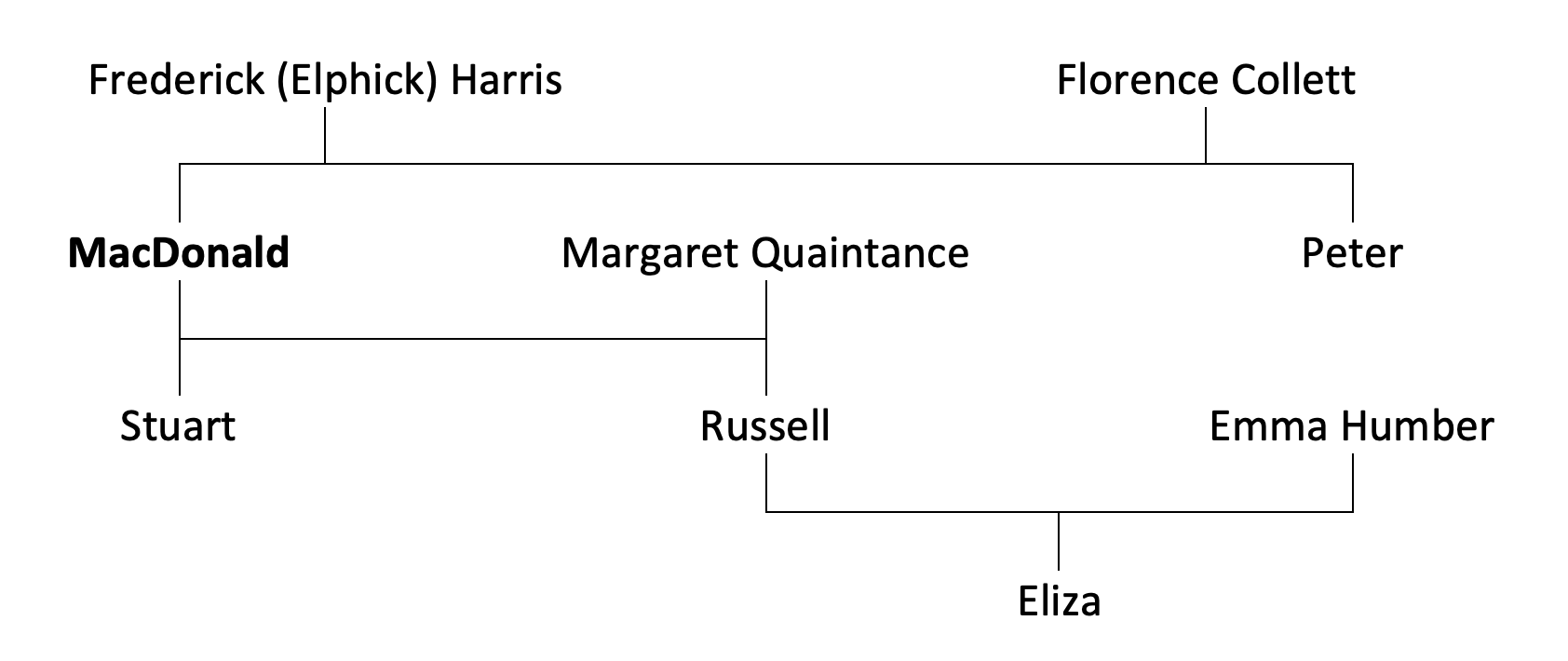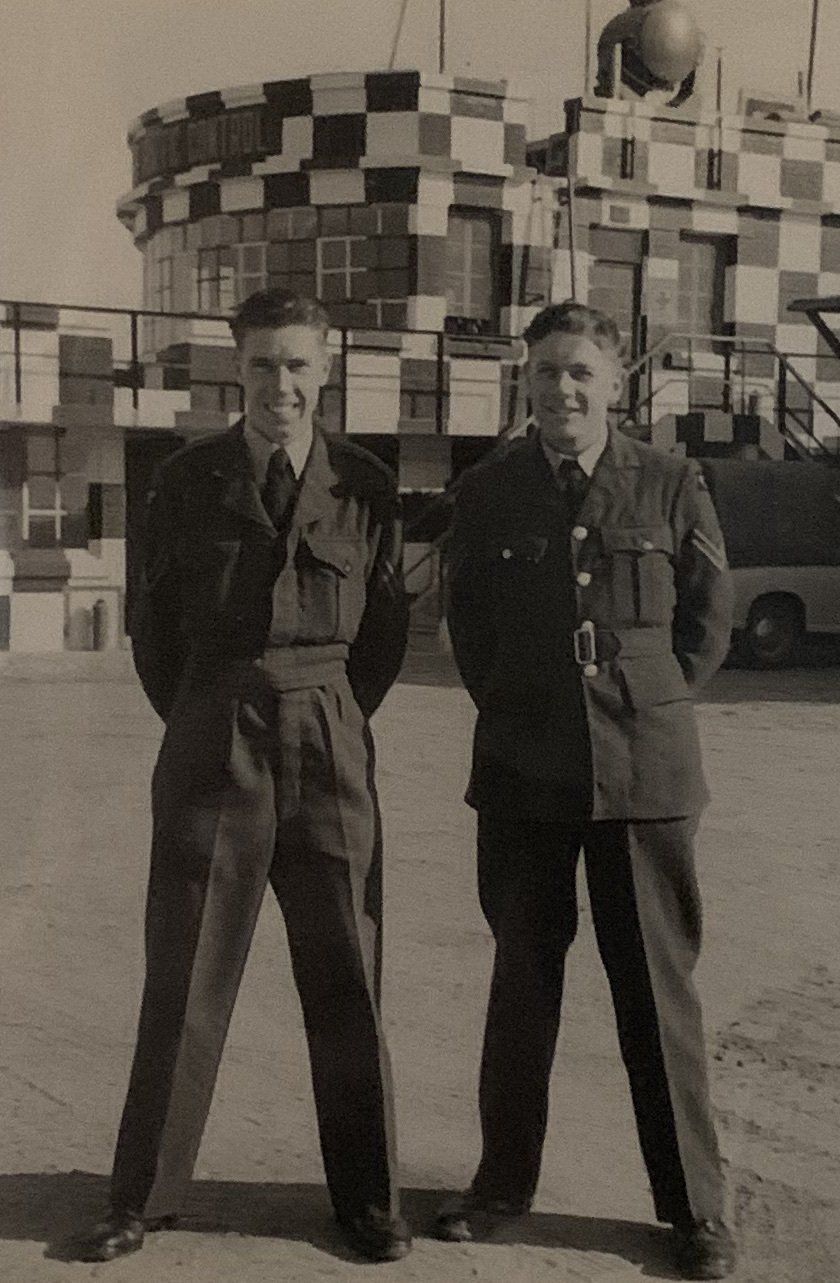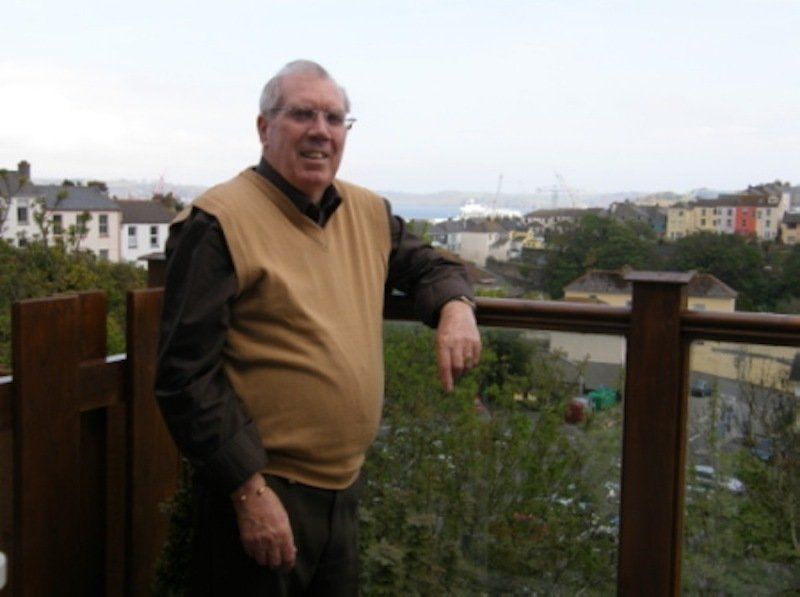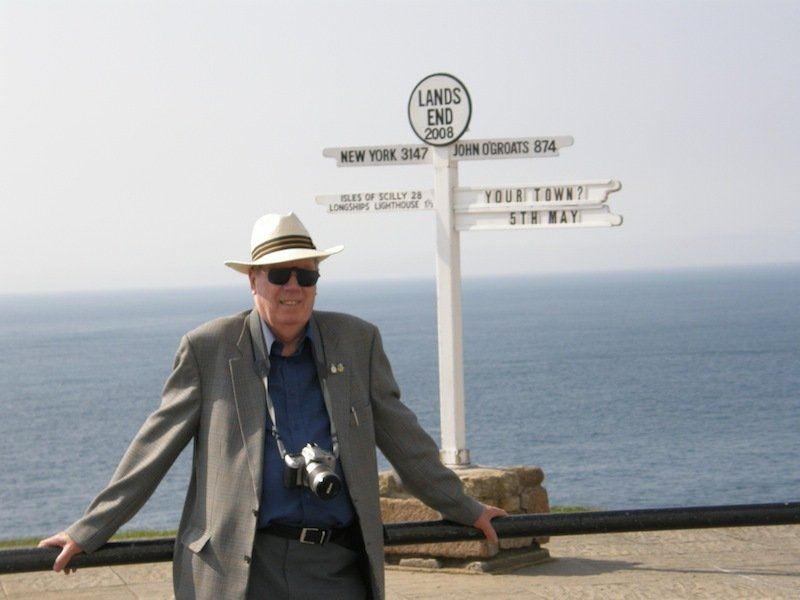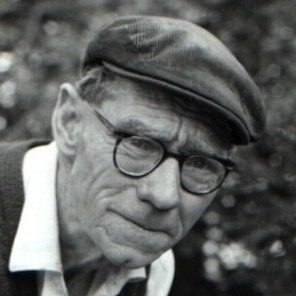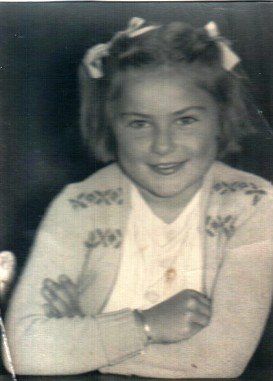MacDonald Frederick George Harris
My Dad
Dad’s Tribute (Eulogy)
Tuesday, 30 August 2011
Firstly, I’d like to thank everyone for coming this afternoon. Dad was a quiet, family man who didn’t really like large gatherings, but I know he’d have been touched by your support today, and I know that my mum, my brother Russell, his wife Emma, and I really appreciate it too.
Dad was a special, loving man. Auntie Pat once said to mum, ‘You don’t get many of them to a dozen’. So many of the cards and conversations I have had over the past few weeks have echoed that exact sentiment: that he was a lovely man.
Shortening dad’s life to a few words on a few pages does not seem to do him justice, so if you’ll forgive me, this is my attempt.
He was born at home on 9 April 1933 to Fred and Florence Harris at 200 Brighton Road in Coulsdon. The building is still there, although now it is occupied by an Indian Take-away. His childhood home though was at 36 Sussex Road, South Croydon, which backed onto the main London to Brighton Railway line, and from his bedroom window, he would have seen the trains billowing smoke over their shoulders as they raced past, so it was no wonder that his fascination with steam trains stayed with him throughout his life.
In recent years, he would plan holidays with mum around the various preserved steam railways and museums across the country, such as the Nation Railway Musuem in York to others in Devon, Wales, Norfolk and Suffolk. On many occasions dad and I would travel to special events held at the Bluebell railway, or in the rail sheds in Brighton and Streatham. He would always be found standing on the footbridge at Coulsdon North with other spotters waiting for a steam special to thunder by. Having dinner on the Orient Express with mum and me was for him certainly a dream come true.
1939 saw the outbreak of war. His father was away most of the time, though from what dad recalled, he spent the majority of the war as a groundskeeper tending to cricket pitches and gardens at some barracks up north. Dad wasn’t evacuated like many children at that time, though he recalled spending some time with relatives on a farm down in Dormansland. One story he told me, was about the Italian prisoners of war that worked in the fields. They wore overalls marked with a black cross on the back, but what surprised him was that out of the numerous POWs, there was only ever one guard. He was told at the time, only one guard was needed – if any made to escape they would aim for the black cross. Of course, no one did escape, after all the prisoners were probably grateful to be spending their time away from the fighting.
Whilst at home in South Croydon during the blitz, dad recalled an incident when he was popping down to the shops for his mum. He couldn’t quite remember if it was to the grocers, the butchers or to get their batteries swapped over and recharged, but the air-raid siren went off, and a neighbour with her children called him over and they sheltered beneath the railway bridge. He remembered a bus driving past at one point, and this was followed, shortly after, by a tremendous explosion that shook the ground. Once the all clear sounded, he headed straight home, but all that was left of the bus was a large crater and mangled metal.
Dad’s favourite pastime during the war was to head down the road with his friends to slip under the fence into the nearby army testing ground, where he would watch tanks driving around some makeshift obstacle course. He never knew if they were testing the tanks, or training the drivers, but at that time he just enjoyed the thrill of sneaking in and watching them run around in circles.
In addition to his interest in steam trains, dad was fascinated by airplanes. His favourites were the traditional stalwarts of the British war effort – the Spitfire, the Hurricane and the Lancaster. In recent years I’ve taken dad to the air museums at Duxford and Henley, and to see a relatively old man turn into a awestruck schoolboy before my eyes is a particular fond memory of mine – sharing his passion of such graceful aircraft.
No doubt this fascination with such aircraft began with the Battle of Britain, that would have echoed over his head as a child, and which gave him the incentive to join the ATC – Air Training Corps – once he was old enough.
Of course, his childhood was not all about war and play. He attended Purley Oaks School until the age of 15, and from his school reports which I recently came across, he showed an aptitude for mathematics, art, woodwork and geography, none of which is a surprise. He was excellent at figures, and would spend countless hours at the kitchen table hunting for an elusive five pence in his ledgers; he loved maps, and would study them like a book – he headed straight for the maps whenever he heard about a new place, planning possible routes there, and highlighting them in yellow, and he never got lost anywhere – well that isn’t actually true, there was one place he always got lost – in car parks. For some reason, multi-storeys were the worst for him to navigate; his pencil drawings were amazing, and the illustrations he once drew for a children’s book I wrote at university were stunning; and anyone who’s been round our house will attest to his ability in making things out of wood!
Whilst at school, he was awarded the title of ‘Top Boy’ at least three times that I was able to find out, and one particular comment made by his headmaster says, “Don has a school report of which his parents may justly be proud.” Surprisingly, I also came across another comment that I found very hard to believe – it said that he needed to take much more care with his handwriting. Those of you who remember dad’s handwriting, would no doubt find such a comment strange too, and those of you who know my handwriting in comparison, and being a teacher myself – well need I say more.
On leaving school, dad worked as an apprentice to an accountancy firm, which was not surprising considering his ability in maths. However three years later, at the age of 18, his apprenticeship was cut short by his National Service. It is of no shock to anyone that he enlisted in to the RAF as a three-year regular rather than the standard recruit, but he did have a scare when he was examined by the Medical Officer, who was concerned about his peculiar heart rhythm. Sent to Croydon General Hospital for a scan, dad learned that the reason for the strange heartbeat was that his heart was actually on the wrong side of his chest. A few weeks later, dad made his way up to Bridgenorth to complete his basic training; ten weeks after that and his ‘passing out’ parade, he headed to Cyprus and Egypt for his placement.
Whilst stationed in Egypt, dad put his maths, art and geography skills to good use, working as an air traffic controller and being in charge of the map room. During his time near the canal zone, the Suez Crisis flared up, and boundary lines on maps changed regularly. Dad organised the map room with such efficiency, that a commander from another air base was so impressed that he requested dad travel with him to implement his map filing system there. On route, the commander was so horrified that the flight plan was not following a direct path to this own air base, that he chastised the pilot in front of dad. The pilot tried to explain that the pyramids at Giza, a world heritage site, was of course a no fly zone, but the commander would have nothing of it – so dad’s claim to fame is that he is one of a handful of people who have actually flown over the pyramids!
Returning from National Service, and having seen a bit of the world beyond our fair shores, dad was not sure if he should go back to continue his accountancy apprenticeship. Whilst he decided what he wanted to do, he was offered a job at his Uncle Jeff’s private car hire firm – Finch’s Cars, based at Coulsdon North Station. There he found three of the most important things of his life: firstly, his vocation. He loved driving, and I’ve already mentioned his passion for maps; secondly, he met his best friend, Ron Quaintance, with whom he would share many a joke over a cup of tea; and thirdly, lastly, and perhaps more importantly, he met his wife, my mum, and Uncle Ron’s baby sister.
Mum and dad were married on 28 March 1973 at Sutton Registry Office. They didn’t have a honeymoon, instead they took the time to do up there little flat in Penge. A year later, and I arrived on the scene, followed two years after that, by my brother, Russell. We moved back to Coulsdon in 1978, into my childhood home, where mum and I still live.
I had a wonderful childhood, thanks in part to my dad. He was always eager to share in my successes and those of my brother, and in recent years, of my sister-in-law too, for they were his successes as well as ours. He never denied us anything, and nothing was ever too much trouble. Just as long as it wasn’t at 7 in the evening – everything stopped then for 15 minutes for the Archers on Radio 4. Otherwise, he would do anything for anybody, and looking back, he spoiled us all rotten, with his time, his energy, his enthusiasm, and his love.
Dad was always singing, and whistling. When mum and dad did a supermarket shop, each taking a shopping trolley, dad would whizz off on his own, racing from item to item on his list; but mum always knew where he was because she could hear him whistling along the aisles! He was an exceptionally happy person. If mum was ever down, he would put silly things on his head, or do a silly dance, just to make her smile. When he was putting his photos in his albums, or his stamps, sitting at the kitchen table whilst mum was doing the ironing, he used to look up, shrug and give her a funny expression just to make her laugh.
He enjoyed his football, something he shared with my brother. They would often go to matches together to see Crystal Palace or Whytleleafe play at home, and once they even went up to White Hart Lane to his team play – Tottenham Hotspur. Russell was always amazed that almost every time they went to Selhurst Park, out of all the rough-looking football fans squeezing through the ticket gates, it was dad who the security men would pull over to frisk! Out would come an assortment of bits and pieces from his pockets – handfuls of sweets, empty wrappers, his little jotter and pencil, loose change, and of course, his large handkerchief. Another time, whilst at Whyteleafe, dad and specifically positioned himself at one side of the pitch where he was certain to see everything, yet was not likely to get hit by a stray ball; unfortunately he tempted fate, and it didn’t quite go according to plan, for the ball struck him squarely on the head!
It never seemed to escape us that dad seemed to have this inane ability to always find something to hit his head against. A car boot, an open cupboard, or a shelf – he almost went out of his way to find something overhanging to bang into! How he never knocked himself out at times was beyond us.
But regardless whatever happened, dad would always laugh things off.
Above all else, he loved his little treats. His sweets and his biscuits. Once home from shopping, he would squirrel the biscuits away in his sock drawer, and would only ever retrieve them in two incidences – if his tin in the front room was getting low, or if his daughter-in-law Emma wanted a biscuit and he’d go get the ‘fresh’ ones.
He loved his sweets, and always had a pocket full. I would often go to the Fairfield Halls to watch various big bands in concerts with dad – Don Lusher, Glenn Miller, the RAF band, of course, and his favourite, Ted Heath – and it was comical to watch him surreptitiously pull a cotton candy from his pocket, and wait for the sumptuous applause before rustling the wrapper off and plunging it into his mouth.
Thinking about dad, he was always happy, and he was at his happiest sitting in the front room, with his family around him, sitting in front of the tv with his assortment of tins around him, filled with all his treats, his favourite being jelly babies and salted peanuts.
A few weeks before he died, dad said, ‘I’ve been very lucky with my life. I’ve had a special wife, and two exceptional sons, and a lovely daughter-in-law, and a comfortable armchair – what more could a man want?’
At the end, he was ready to die. Although we, his family, knew it was coming, there is nothing you can really do to be prepared. We were not ready to let him go:
Who will clean Emma’s shoes now when they need a polish?
Who will complain with Russell about the football and cricket results and their players?
Who will come to me asking for answers to the crossword, and then phoning Uncle Ken claiming to have done it all by himself?
Who will be there for mum, day in, day out, sharing each and every moment together?
There is no answer or words of comfort here. But Emma did suggest the following poem.
I'd like the memory of me
to be a happy one.
I'd like to leave an afterglow
of smiles when life is done.
I'd like to leave an echo
whispering softly down the ways,
Of happy times and laughing times
and bright and sunny days.
I'd like the tears of those who grieve,
to dry before the sun
of happy memories
that I leave when life is done.
I know mum likes to think that he is somewhere up there with his much loved brother-in-laws – Uncle Ron and Uncle Arthur – sitting around, laughing, and all drinking tea which was, of course, their favourite tipple.
My dad was intelligent, warm, kind, quiet, and funny. There was nothing brash or showy about him. Not at all. Essentially, he was a true gentleman. Perhaps the best epitaph to him was written by his teacher in his final school report when he was 15 years old: ‘I have a very high opinion of his character and his capabilities.’ Of that, I cannot disagree.
Of course, the price of love is grief. Today we grieve for the loss of a wonderful father, a wonderful husband and a wonderful friend to so many. We will all miss him dearly. But in our memories, those who have gone can live on, and so I would like to ask you all to take a moment to reflect of your own memories of my dad whilst the following music is playing.
Official Documentation
Census Data
None
Other Documentation
Other relevant documents for view will be listed below...
- Birth Register 1933
- Here is a copy of the birth register with my father's listing. It includes his mother's maiden name (Collett) and the district (Croydon)
- Marriage Register 1973
- Here is a copy of the marriage register with my father's listing. It includes my mother's maiden name (Quaintance) and the district (Sutton)
- Electoral Register 1965
- In 1965, my dad was living at home with his parents and his younger brother, Peter, at 36 Sussex Road, South Croydon
